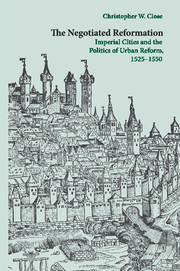Book contents
- Frontmatter
- Contents
- List of Abbreviations
- Acknowledgments
- Map One South German Imperial Cities ca. 1525
- Map Two Imperial Cities in Upper and Eastern Swabia
- Introduction
- 1 Consultation and the Urban Hierarchy
- 2 Imperial Cities and Collective Politics
- 3 Preachers, Consultation, and the Spread of Urban Reform in Southern Germany
- 4 The Urban Reformation in Donauwörth
- 5 The Urban Reformation in Kaufbeuren
- 6 Negotiation and the Rural Reformation in Eastern Swabia
- 7 Eastern Swabia and the Schmalkaldic War
- Conclusion
- Bibliography
- Index
- References
2 - Imperial Cities and Collective Politics
Published online by Cambridge University Press: 26 December 2009
- Frontmatter
- Contents
- List of Abbreviations
- Acknowledgments
- Map One South German Imperial Cities ca. 1525
- Map Two Imperial Cities in Upper and Eastern Swabia
- Introduction
- 1 Consultation and the Urban Hierarchy
- 2 Imperial Cities and Collective Politics
- 3 Preachers, Consultation, and the Spread of Urban Reform in Southern Germany
- 4 The Urban Reformation in Donauwörth
- 5 The Urban Reformation in Kaufbeuren
- 6 Negotiation and the Rural Reformation in Eastern Swabia
- 7 Eastern Swabia and the Schmalkaldic War
- Conclusion
- Bibliography
- Index
- References
Summary
One of the most iconic events of the early Reformation involved a series of peasant rebellions that spread across the Holy Roman Empire in the years 1524–6. Known collectively as the Peasants' War, these uprisings combined traditional demands for economic reform with calls for reordering society according to the evangelical ethos of the New Testament. Many areas of southern Germany experienced intense outbursts of revolution, which in February 1525 caused the Swabian League to mobilize its members' troops in defense of the common peace. While the alliance's soldiers helped defeat the rebels, the Peasants' War undermined the League's cohesiveness. Many League members used the suppression campaign as an excuse to enrich their own territories, especially at the expense of ecclesiastical states that could not marshal military forces to protect themselves. This led to growing friction within the League's ranks and dissatisfaction with some of its central policies. In the war's aftermath, as many of the alliance's princely estates came to view religious reform as a threat to public order, discord within the alliance placed growing pressure on the Central Council to root out the Reformation among its members. This strategy brought the Council into conflict with the alliance's imperial cities, which many princes blamed for the war's outbreak. Tensions came to the surface in 1527, when the Central Council ordered its member cities to expel evangelical preachers on the grounds that ringleaders of the Peasants' War had taken refuge behind city walls.
- Type
- Chapter
- Information
- The Negotiated ReformationImperial Cities and the Politics of Urban Reform, 1525–1550, pp. 57 - 83Publisher: Cambridge University PressPrint publication year: 2009



